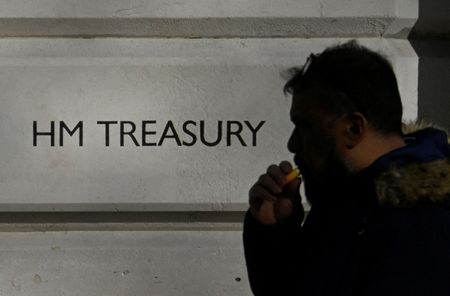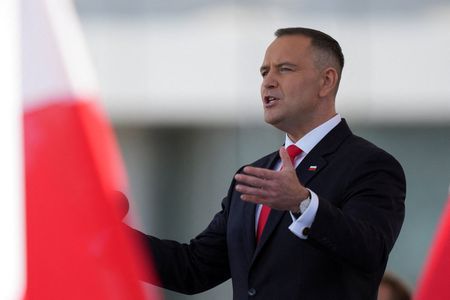(Corrects second paragraph to show annual increase is in pounds, not percent)
By William Schomberg
LONDON (Reuters) -Britain’s public borrowing in the financial year so far has matched the forecasts that underpin the government’s tax and spending plans, offering a bit of breathing space to finance minister Rachel Reeves before bigger challenges later this year.
Borrowing in the April-to-July period totalled 60 billion pounds ($81 billion), up by almost 7 billion pounds from a year earlier but in line with a forecast of 59.9 billion pounds published by the Office for Budget Responsibility earlier this year.
However, since the forecast was made Prime Minister Keir Starmer’s government has backtracked on plans to cut spending in the welfare system and elsewhere, and there are expectations that the OBR will lower its economic growth projections.
That means Reeves is still likely to be raising taxes or cutting spending in her budget in the autumn – probably by more than 20 billion pounds, according to analysts – to remain on track to meet her fiscal rules and avoid unsettling investors.
In July alone, the government borrowed 1.1 billion pounds ($1.5 billion), the lowest borrowing for the month in three years, Thursday’s data showed.
The OBR had pencilled in an overshoot of 2.1 billion pounds for July. A Reuters poll of economists showed a median forecast of a 2.6 billion-pound deficit.
Over the first four months of the tax year, an increase in April in social security contributions paid by employers swelled the compulsory social contributions component of the public finances by more than 17% to almost 64 billion pounds.
Receipts from income and capital gains taxes rose by 8.3% to over 100 billion pounds, helped by the ongoing freeze in the thresholds at which people must pay income tax.
Government spending on debt interest in the April-to-July period jumped by more than a quarter to 41.4 billion pounds and the strain on the public finances was likely to grow.
“Rising inflation points to increases in the cost of index-linked borrowing later this year. Gilt yields have also risen through August,” Dennis Tatarkov, a senior economist at KPMG UK, said.
He estimated Reeves in her autumn budget would need to plug a shortfall of 26.2 billion pounds to remain on course to meet her target of balancing day-to-day spending with tax receipts by the end of the decade.
Media have reported that the finance ministry is considering ways to raise more money from the sale of homes.
Earlier this month, the National Institute of Economic and Social Research, a think tank, projected the overshoot at 41 billion pounds.
($1 = 0.7435 pounds)
(Writing by William Schomberg; Editing by Paul Sandle and Emelia Sithole-Matarise)











